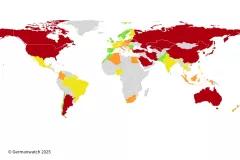Press release from the Climate Action Tracker
Read the full analysis from the Climate Action Tracker
The rapid entry into force of the Paris Agreement has created the legal basis for countries to increase their level of action and ambition to meet the 1.5°C warming limit over the next two years in the lead-up to 2018. The Climate Action Tracker (CAT) has evaluated the starting point for this process and found there has been little progress on national climate policies in the eleven months since the Paris Agreement was adopted.
Government pledges and climate action commitments made under the now-ratified Paris Agreement will lead to a warming of 2.8°C, with a likely chance of holding warming below 3.1°C (1). The CAT has also assessed current government policies and found little change from Paris. Policies still lead to a warming of 3.6°C, now even further from the globally agreed warming limit of 1.5°C.
Assessments have been updated for 25 countries, amounting to 69% of global emissions, and no government has gained an upgraded rating.
The CAT scientists warned that even without the increased uncertainty over US policy precipitated by the election results, the task of improving climate action would require a renewal of the political support and energy that led to the adoption and rapid entry into force of the ambitious Paris Agreement.
“The strong tailwinds for climate action we see today in many parts of the world, with the incredibly rapid growth of renewable technologies worldwide, the rapid acceleration of the markets for electric vehicles and plummeting battery storage costs, fundamentally change the geopolitical forces working on climate policy,” said Climate Analytics CEO and Senior Scientist Bill Hare.
“Provided political leaders globally maintain their commitment to action, these tailwinds mean we should be able to ride through the turbulence that a climate sceptic in the White House could bring,” said Hare.
“The US is unlikely to meet its nationally determined contribution made under the Paris Agreement and, if the President-elect Trump abandons current policies as he has threatened to, we estimate that in 2030, US emissions will be similar to what they are today,” said Prof Niklas Höhne, of NewClimate Institute.
“In contrast, the most recent data show China’s coal use has reduced for the third year in a row, and its CO2 emissions are likely to peak between 2025 and 2030, as it states in its climate plan. The position of a global climate leader is open – also to China.”
Meanwhile, the CAT analysis found that developments in India were among the most important underway globally.
“India may have been expected to increase its coal-fired power use for decades. Instead, there appears to be a transition underway with an extremely rapid growth in renewable energy installations, which has begun to displace planned coal at a scale that has surprised many analysts,” said Niklas Höhne.
Bill Hare noted the opportunity now existed for the European Union to re-establish its leadership on climate change.
“With US policy currently up in the air, there’s even more reason now for the European Union to lift its game. At a time when it needs to triple its climate efforts to decarbonise by 2050, the EU is slowing down, and instead needs to move forward faster,” he said.
The full analysis can be found here, and the updated country assessments can be found on the Climate Action Tracker website here.
(1) The change from the CAT’s 2.7°C estimate made before the Paris talks last year is down to changes in emissions projections data rather than government action.
Go to Climate Action Tracker






